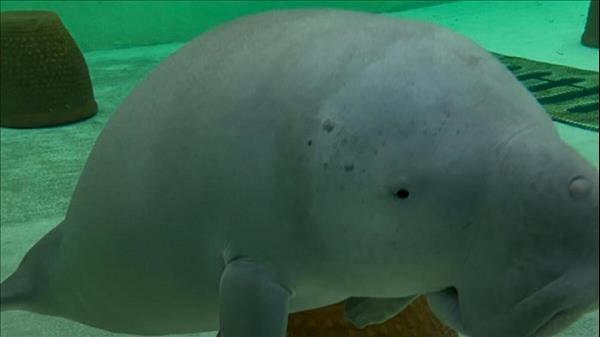(MENAFN- Khaleej Times) Published: Wed 12 Apr 2023, 12:06 PM Last updated: Wed 12 Apr 2023, 12:09 PM
Environment Agency – Abu Dhabi (EAD) has rescued and rehabilitated a young male dugong calf, which was found abandoned in June 2019. The marine animal was discovered by agency rangers at the Marawah Marine Biosphere Reserve.
Alone, without its mother and far away from any herd, the dugong was found following a few days of strong winds, which may have contributed to the dugong's separation from his mother and the group. The dugong was named Malqout – an Arabic word that means 'saved' and 'whose owner is not known' – perfectly expressing the young animal's condition.
Due to Malqout's weight and unstable condition, EAD's team confirmed that he was suffering from dehydration and malnutrition, and needed specialised veterinary care. The decision was made to transfer him to a specialised facility in Abu Dhabi, staffed by animal husbandry experts and qualified veterinarians.
EAD coordinated with locally based zoological experts, Worldwide Zoo Consultants) to provide veterinary consultancy and ongoing specialist care in animal husbandry. The specialists advised keeping Malqout under round-the-clock human supervision due to his poor health, supported by the availability of appropriate resources that could provide the highest standards of care.
The successful rescue and rehabilitation process of Malqout is one of the rarest cases in the world. EAD succeeded in caring for Malqout even though dugongs do not respond well in captivity, by drawing on its extensive experience garnered over 25 years, which includes several research and scientific studies on dugong protection and preserving habitats and marine species. Dugongs rely heavily on their mothers for the first 18 months of life, but EAD was able to provide the best environment for Malqout to survive.
To rehabilitate Malqout, continuous 24-hour veterinary care was provided until he was gradually weaned and trained to eat seaweed. To maintain his quality of life after that initial period, Malqout needed special care from qualified veterinarians, including suitable facilities to accommodate his growth, and to protect him from volatile weather conditions and loud noises. EAD and the team of experts provided a stimulating environment with suitable space in which Malqout could learn about natural behaviour patterns, while ensuring his long-term growth. The team of experienced veterinarians provided special formula food to treat dehydration and malnutrition. Since then, Malqout has grown from 60 cm to nearly two metres' long and has been given a clean bill of health.
According to information from an MoU by the Secretariat of the Conservation and Management of Dugongs and previous attempts made around the world, no dugong to date successfully rehabilitated in captivity has been released back into its natural environment. Knowing that Malqout lacks the natural survival instinct acquired in the early stages of a dugong's life – and in order to mitigate any other risks – EAD decided not to release him. Being young and reared in a controlled environment, he has not developed normal immunity and has adapted to receiving specialist human care, which hinders his ability to interact with other species and avoid predators.
Since the rehabilitation, the best option for Malqout is to continue his life under consistent human supervision, and his survival story is testament to the quality of care available in Abu Dhabi. EAD and its partners are well equipped to care for Malqout, while the team of veterinarians and dugong experts will be able to monitor his condition on a regular basis.
There are approximately 3,000 dugongs in the territorial waters of Abu Dhabi, and they are mostly found near Bu Tinah Island, which forms part of the Marawah Biosphere Reserve and Al Yasat Marine Protected Area. EAD is responsible for providing protection for the second-largest gathering of dugongs in the world, after Australia. As such, EAD is doing everything in its power to ensure the preservation and reduce the mortality rates of the dugong population, as well as any risks that threaten them, thanks to its specialised team, which includes experts and researchers who are well versed in the habits and behaviour of dugongs.
ALSO READ:
uae: residents find washed-up jellyfish on abu dhabi beaches; authority issues advisory
abu dhabi: innovative marine biodiversity restoration solutions deployed off the coast
watch: dubai resident goes fishing, gets surprise 'happy water dance' from pod of dolphins

















Comments
No comment